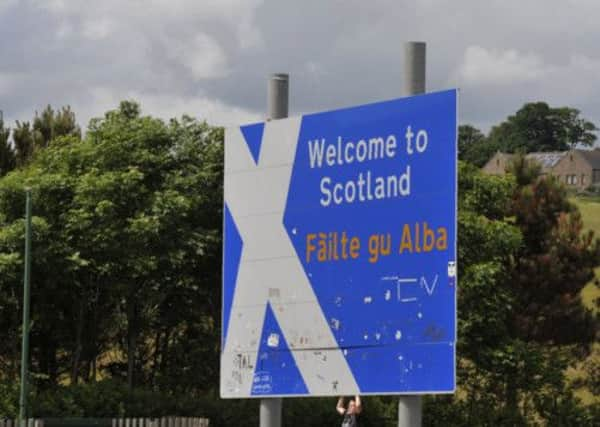Michael Fry: Osborne warning borders on bizarre


The only country Scotland has a border with is England. This may be an unremarkable fact, but it is one on which the Chancellor of the Exchequer, George Osborne, laid special stress during his visit among us this week, taking the lead, as he has vowed to do, on the British government’s side in the referendum on Scottish independence next year.
Mr Osborne this time made nothing of the unionist claim that at some point after 18 September, 2014, the Anglo-Scottish Border could be closed for the first time since 1603. This is a pedantic deduction from the nominal requirement on an independent Scotland to adhere to the European agreement on free movement, the Schengen agreement, which the UK has not joined.
Advertisement
Hide AdAdvertisement
Hide AdBut since the agreement does not apply to the border between the UK and the Republic of Ireland, there is a clear precedent for not applying it to a future border between Scotland and England. That would mean the whole of our archipelago remaining outside Schengen: not an ideal but at least a workable solution, surely preferable at any rate to the unionist idea of customs posts at Berwick and Carlisle.
So it is good to see one of the sillier arguments dropped, but Mr Osborne immediately replaced it with another. The paper from HM Treasury released to coincide with his trip to Aberdeen spoke of the “border effect”, which, according to some economists, affects any given pair of independent countries with a border dividing them. On this view, the trade between the two countries will be less than if the border did not exist, and both will be the worse off for it.
It must be said that almost all the evidence for this theory has been drawn from the border between the US and Canada which, at 3,000 miles long, is a somewhat more formidable barrier than our own 60 miles from sea to shining sea. On the gloomiest calculation, this line drawn across North America depresses trade between its two halves by 44 per cent. With the analytical rigour for which the No campaign is becoming famous, it is immediately assumed there would be a similar effect as between Scotland and England, soon reducing us all on this side of the Border to penury and starvation. When in doubt, shock the Jocks.
There are, needless to say, plenty of other economists who dispute that a mere border can ever have such an effect, especially an open border, and point to the host of different factors that may have come into play in North America. From our point of view on this shore of the pond, the obvious difference is that the US and Canada have been dismantling the previous regime of protectionism which divided them and which has probably left some effects on patterns of trade.
By contrast, Scotland and England have had free trade for the past three centuries, while Britain has for the past 40 years been part of a regime of free trade in the EU which would not in any way be affected by Scottish independence, assuming Scotland carried on as a full member. Even in the unlikely event of that not being so, Scotland would just come to the same arrangement that countries such as Norway and Switzerland enjoy in the European Free Trade Area. Mr Osborne’s was just another scare story.
But there was an even worse one. According to the same bundle of predictions from the Treasury, Scotland’s exports to England would fall by 80 per cent up to the middle of the 21st century. This was an amazingly precise and confident forecast from an outfit which, in the real world, is unable to tell us by how much its spending will exceed its revenue from one year to the next, for example, from 2012 to 2013. Perhaps Mr Osborne should heed the advice of his predecessor in office, Alistair Darling, now head of the No campaign, that he should stop treating Scottish voters like idiots with his ludicrous scare stories. In that real world, there is actually evidence that the creation of a border can also have a positive effect – for example, by allowing failed economic policies to be killed off and better ones to be put in their place. The prime example is Slovakia, once treated as the poor relation inside Czechoslovakia, just in the way that Scotland has been treated inside the UK.
When Slovakia declared its independence, exactly 20 years ago in September 1993, it acquired by that act five borders: one with the Czech Republic, then others with Austria, Hungary, Poland and Ukraine. There does not seem to have been much of a “border effect” here because Slovakia has since boomed, at least once it succeeded in finding the right economic policies.
Much like Scotland in the past, Slovakia had always been treated as a regional problem inside a bigger country.
Advertisement
Hide AdAdvertisement
Hide AdEconomic policies directed from a capital several hundred miles away saddled it with steelworks and coal mines while encouraging its people to regard modernisation as their enemy. All that changed once the Slovaks were able to start looking out for themselves, to open their eyes to the world beyond the old borders and reach their own conclusions about how to come to terms with it.
As soon as it turned to free markets, the Slovakian economy took off, fuelled by fiscal policies such as flat tax and no taxation of dividends. In the single year of 2007, it achieved a growth rate of more than 10 per cent; for comparison, it would take Scotland, even in times of normal economic activity, five years to match that.
It all goes to show that borders are more in the mind than on the ground, and that the way to break them lies in inspired thinking, not mindless prejudice.